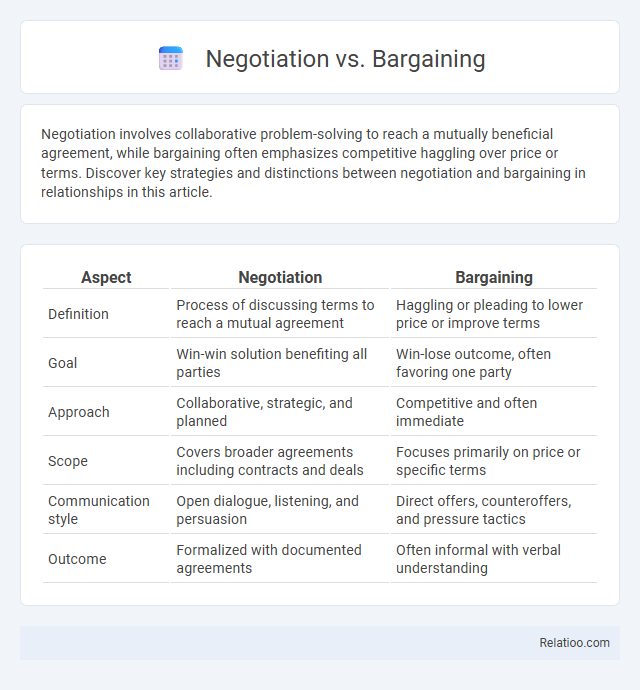Negotiation involves collaborative problem-solving to reach a mutually beneficial agreement, while bargaining often emphasizes competitive haggling over price or terms. Discover key strategies and distinctions between negotiation and bargaining in relationships in this article.
Table of Comparison
| Aspect | Negotiation | Bargaining |
|---|---|---|
| Definition | Process of discussing terms to reach a mutual agreement | Haggling or pleading to lower price or improve terms |
| Goal | Win-win solution benefiting all parties | Win-lose outcome, often favoring one party |
| Approach | Collaborative, strategic, and planned | Competitive and often immediate |
| Scope | Covers broader agreements including contracts and deals | Focuses primarily on price or specific terms |
| Communication style | Open dialogue, listening, and persuasion | Direct offers, counteroffers, and pressure tactics |
| Outcome | Formalized with documented agreements | Often informal with verbal understanding |
Understanding Negotiation and Bargaining
Negotiation involves a strategic dialogue between parties aimed at reaching a mutually beneficial agreement, emphasizing problem-solving and relationship building. Bargaining focuses more on the exchange of offers and concessions, often centered around price or terms without broader collaboration. Understanding negotiation requires recognizing the importance of communication, trust, and long-term value creation, while bargaining typically prioritizes immediate gains and transactional outcomes.
Key Differences Between Negotiation and Bargaining
Negotiation involves a strategic discussion aimed at reaching a mutual agreement, emphasizing collaboration and long-term relationship building, whereas bargaining typically refers to haggling over price or terms with a focus on immediate gain. Key differences include negotiation's broader scope encompassing complex issues and multiple parties, while bargaining is often limited to transactional exchanges between buyers and sellers. Effective negotiation requires preparation, communication skills, and problem-solving, in contrast to bargaining, which relies more on persuasion and offers.
Core Principles of Negotiation
Core principles of negotiation emphasize mutual benefit, effective communication, and interest-based problem solving, distinguishing it from bargaining, which often centers on haggling over price or terms. Negotiation involves preparation, understanding both parties' needs, and seeking win-win outcomes to build long-term relationships. Your ability to apply these principles enhances value creation and fosters collaboration beyond mere transactional exchanges.
Core Principles of Bargaining
Bargaining centers on reaching a mutual agreement through give-and-take, emphasizing flexibility, compromise, and understanding the interests of all parties involved. Core principles of bargaining include effective communication, problem-solving orientation, and the willingness to make concessions to achieve a satisfactory outcome. You can leverage these principles to navigate conflicts and secure deals that benefit everyone while maintaining positive relationships.
Strategies Used in Negotiation
Negotiation strategies emphasize collaboration, aiming for win-win outcomes through effective communication, active listening, and interest-based problem solving, unlike bargaining which typically centers on price or terms in a more competitive and transactional manner. Key techniques in negotiation include preparation and planning, building rapport, anchoring offers, and using integrative tactics to create mutual value. Employing these strategies enhances the potential for sustainable agreements by addressing the underlying needs and priorities of all parties involved.
Techniques Common in Bargaining
Bargaining techniques often include making initial offers, counteroffers, and concessions to reach a mutually acceptable agreement, emphasizing flexibility and compromise. Unlike formal negotiation methods that may involve structured processes and strategic planning, bargaining typically relies on direct communication and quick decision-making. You can enhance your bargaining skills by practicing active listening, understanding the other party's priorities, and maintaining a collaborative attitude to secure favorable terms.
Advantages of Negotiation Over Bargaining
Negotiation offers a structured approach to resolving conflicts that fosters collaboration and long-term relationships, unlike bargaining which often centers on short-term gains and competitive tactics. Your ability to engage in negotiation enhances mutual understanding and creates value for all parties involved through clear communication and problem-solving. This results in more sustainable agreements and increased satisfaction compared to the transactional nature of bargaining.
When to Use Negotiation vs Bargaining
Negotiation is best used in complex situations requiring collaboration, problem-solving, and long-term relationship building, such as business partnerships or salary discussions. Bargaining suits simple transactions focused on price or terms in short-term or one-time deals like market purchases or car sales. Choosing negotiation over bargaining depends on the need for mutual understanding and value creation rather than quick exchanges or competitive haggling.
Common Mistakes in Negotiation and Bargaining
Common mistakes in negotiation and bargaining often involve failing to prepare adequately, misunderstanding the other party's interests, and focusing solely on price rather than value creation. You risk sabotaging outcomes by neglecting effective communication or conceding too quickly without exploring alternatives that can benefit both sides. Recognizing the distinct objectives and strategies between negotiation and bargaining helps avoid these pitfalls and fosters more successful agreements.
Building Effective Negotiation and Bargaining Skills
Building effective negotiation and bargaining skills involves mastering communication techniques, understanding underlying interests, and developing emotional intelligence to achieve mutually beneficial agreements. Negotiation encompasses a broader strategic process aimed at long-term relationship building, while bargaining often refers to a more transactional exchange focused on price or terms. Enhancing skills in both areas requires practice in active listening, persuasive argumentation, and creating value for all parties involved.

Infographic: Negotiation vs Bargaining
 relatioo.com
relatioo.com